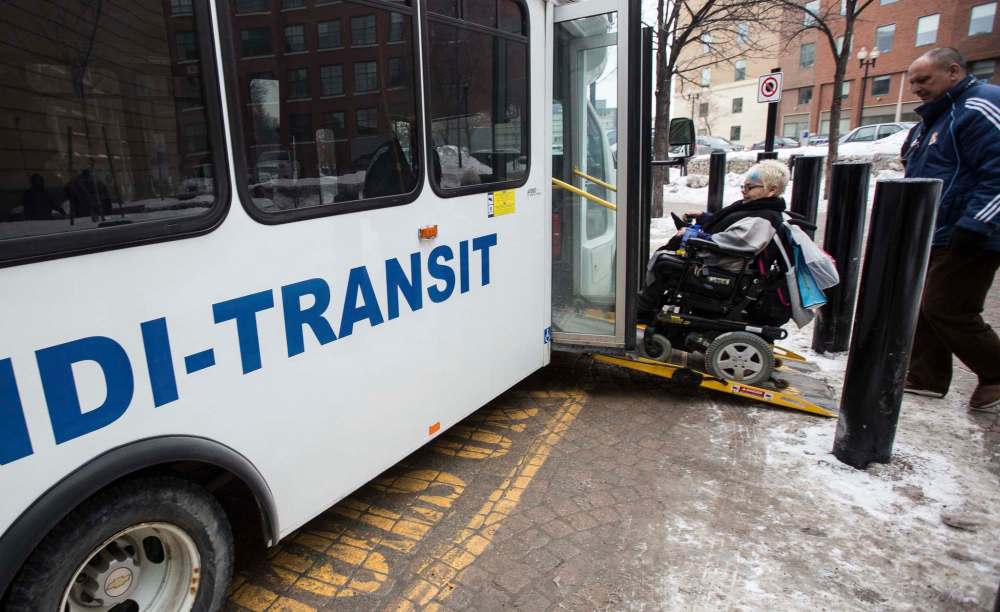City eyes return as Transit Plus provider
Advertisement
Read this article for free:
or
Already have an account? Log in here »
To continue reading, please subscribe:
Monthly Digital Subscription
$1 per week for 24 weeks*
- Enjoy unlimited reading on winnipegfreepress.com
- Read the E-Edition, our digital replica newspaper
- Access News Break, our award-winning app
- Play interactive puzzles
*Billed as $4 plus GST every four weeks. Offer only available to new and qualified returning subscribers. Cancel any time.
Read unlimited articles for free today:
or
Already have an account? Log in here »
Hey there, time traveller!
This article was published 04/11/2019 (1915 days ago), so information in it may no longer be current.
Winnipeg city council will explore bringing 30 per cent of Transit Plus contracts back in-house, which proponents say would result in a more efficient service for citizens who rely on it.
“I was pleasantly surprised it passed,” said St. Vital Coun. Brian Mayes, who introduced the idea in a preliminary motion to the standing policy committee on innovation and economic development Monday morning.
Currently, the city’s Transit Plus service (formerly Handi Transit) is delivered entirely through outside contracts with private companies. That has been the case since 1997, when city administration selected a local firm to take over the last seven buses it had previously run. Before that time, the city held roughly 30 per cent of the contracts, Mayes said.

The motion calls for the city to move toward that figure by June 30, 2022, and Mayes told the committee it would improve service and address increasing costs the city pays per ride to private companies. Between 2009 and 2018, the cost-per-ride has risen by nearly 50 per cent, outpacing the rate of inflation, he said.
“That’s a very big increase for a system that’s entirely privatized,” Mayes said. “It’s a sharp increase, and I’d like to see some alternative to that.”
While contract costs have risen, according to the city’s budget reports for 2019, revenues for Transit Plus are dropping: in 2017, the service’s revenue was $7.06 million; by 2021, it’s projected to decrease to $5.29 million.
Transit Plus is a pre-booked service, providing door-to-door transportation for people unable to regularly use regular transit due to physical disability.
The motion stated the city would get back to controlling 30 per cent, provided an agreement could be reached with Amalgamated Transit Union Local 1505 to deliver the services at a cost-per-ride “roughly comparable to current privatized services.”
ATU spokesperson Zach Fleisher addressed the committee Monday in support of the motion. He argued the privatization of Transit Plus services has resulted in lower wages for unionized drivers, poor quality services for people relying on it, and a lack of public scrutiny over how the service operates.
Fleisher suggested if the city were to move a portion of the contracts in-house as a pilot project, gauging user opinions on whether private or public Plus service is better, the public would likely prefer the non-privatized option.
“Most city councils didn’t make the same mistake we made to privatize,” he said, adding more than 20 years later, Winnipeg “is still paying the price.”
All councillors on the committee — Shawn Nason (Transcona), Janice Lukes (Waverley West), Markus Chambers (St. Norbert-Seine River) and John Orlikow (River Heights) — voted in favour of the motion.
Nason expressed some concern over whether the City of Winnipeg could deliver individualized service as needed, but said it was clear Transit Plus needs to change.
“We’re failing the most vulnerable of our population, and we need to do more, and more effectively,” he said. “We want to make sure we’re an inclusive society for those individuals that really rely on this service to get about their day.”
The city’s innovation department will prepare a report over the next four months.
ben.waldman@freepress.mb.ca

Ben Waldman
Reporter
Ben Waldman covers a little bit of everything for the Free Press.
Our newsroom depends on a growing audience of readers to power our journalism. If you are not a paid reader, please consider becoming a subscriber.
Our newsroom depends on its audience of readers to power our journalism. Thank you for your support.



